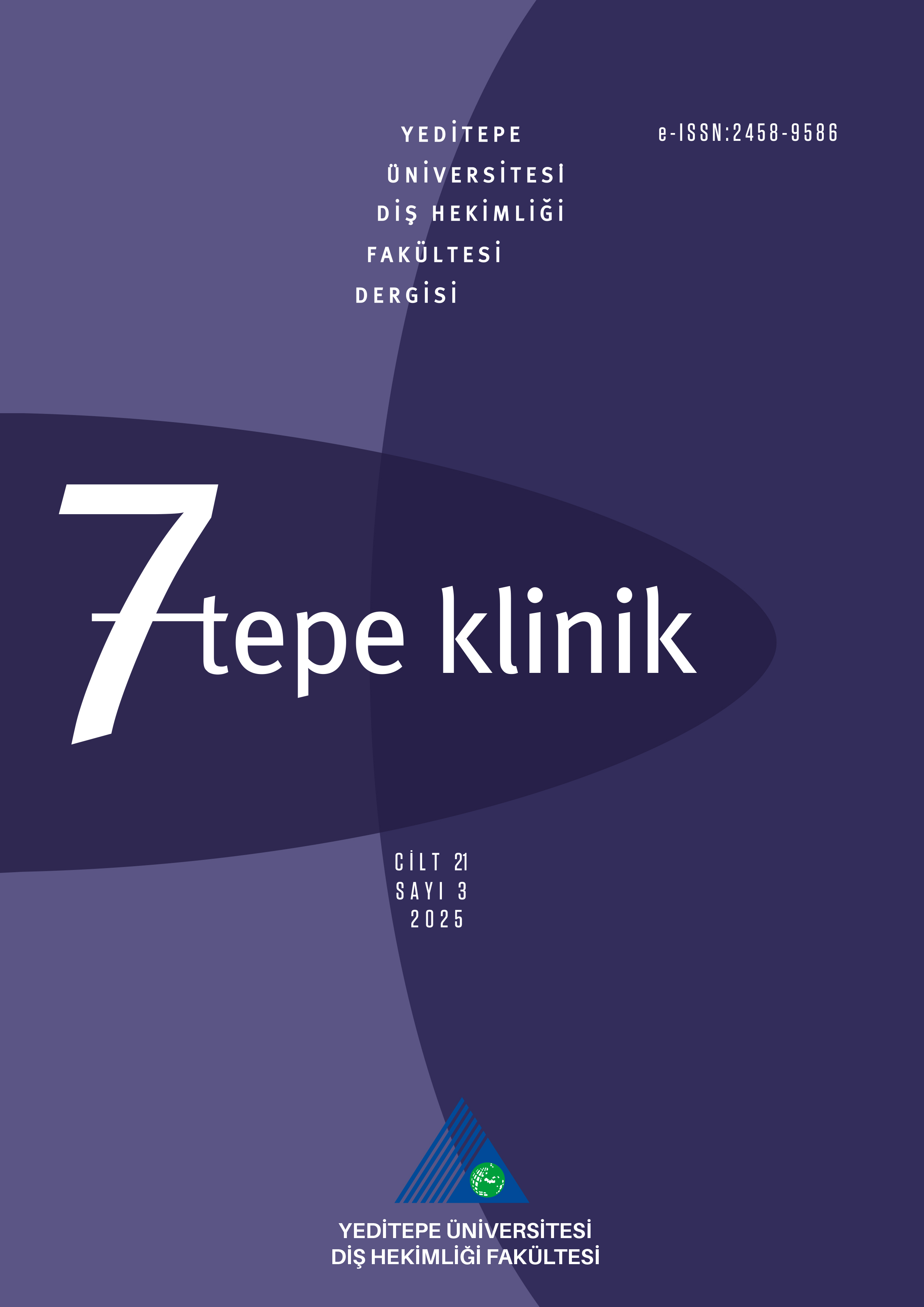Yeditepe Üniversitesi Diş Hekimliği Fakültesi Öğrencilerinin Ağız Sağlığı Tutum ve Davranişlarının Değerlendirilmesi
Ebru Özkan Karaca, Ogül Leman TunarYeditepe Üniversitesi Diş Hekimliği Fakültesi, Periodontoloji Ana Bilim Dalı,i̇stanbulGİRİŞ ve AMAÇ: Bu çalışmanın amacı, bir grup Türk dişhekimi öğrencisinin ağız sağlığı tutum ve davranışlarının ve pre-klinik ve klinik öğrencilerin davranış farklılıklarını Hiroshima University-Dental Behavioural Inventory (HU-DBI) kullanarak değerlendirmektir.
YÖNTEM ve GEREÇLER: Araştırmaya Yeditepe Üniversitesi Dişhekimliği fakültesinde 2018-2019 eğitim-öğretim yılında okumakta olan 1., 2., 3., 4. ve 5. Sınıf öğrencileri davet edildi. Çalışmaya dahil edilme kriterleri 1) tüm sorulara cevap verilmesi 2) doğum tarihlerinin ve cinsiyetlerin bildirilmesiydi. Çalışmada öğrencilerin ağız hijyeni alışkanlık ve davranışlarının belirlenmesi için 20 soruluk HU-DBI anketinin İngilizce formu uygulandı. HU-DBI skorunun gruplar arası karşılaştırmalarında Kruskal Wallis testi ve farklılığa neden çıkan grubun tespitinde Mann Whitney U test kullanıldı. HU-DBI skorunun preklinik ve klinik sınıflar arası karşılaştırmalarında Mann Whitney U test kullanıldı. Anlamlılık p<0.05 düzeyinde değerlendirildi.
BULGULAR: Araştırmaya Yeditepe Üniversitesi Dişhekimliği fakültesinde 2018-2019 eğitim-öğretim yılında okumakta olan 1., 2., 3., 4. ve 5. öğrencilerinden toplam 217 kişi katıldı. Tüm öğrencilerin HU-DBI skor ortalaması 7.04±1.47olarak tespit edilirken, klinik öğrencilerinin HU-DBI skor ortalaması (7.35±1.42), preklinik öğrencilerinden (6.83±1.47) istatistiksel olarak anlamlı düzeyde yüksek bulundu (p<0.05).
TARTIŞMA ve SONUÇ: Araştırmaya katılan öğrencilerin ağız sağlığı tutum ve davranışları HU-DBI skorları bazında genel olarak yüksek bulundu. Eğitim yılı arttıkça ağız sağlığı tutum ve davranışlarında istatistiksel olarak anlamlı artış gözlendi. Öğrencilerin eğitim aldıkları süreç ve klinik tecrübe arttıkça bireysel ağız sağlığı tutum ve davranışları da olumlu yönde gelişmektedir.
Anahtar Kelimeler: Ağız sağlığı tutum ve alışkanlığı, Diş hekimliği öğrencileri, HU-DBI
Evaluation of Oral Health Attitudes and Behaviors of Yeditepe University Dental Faculty Students
Ebru Özkan Karaca, Ogül Leman TunarDepartment Of Periodontology,yeditepe University Dental Faculty, İstanbul, TurkeyINTRODUCTION: The aim of this study was to evaluate the oral health attitudes and behaviors of a group of Turkish dentist students and the behavioral differences of pre-clinical and clinical students using Hiroshima University - Dental Behavioral Inventory (HU-DBI).
METHODS: 1st, 2nd, 3rd, 4th and 5th grade students who were studying in/at Yeditepe University Faculty of Dentistry in 2018-2019 academic year were invited to the study. To determine the oral hygiene habits/routines and behaviors of the students, the English form of the 20-item HU-DBI questionnaire was applied. Kruskal Wallis test was used for the comparison of HU-DBI scores between the groups and Mann Whitney U test was used for determining the group causing the difference. Statistical significance was determined at the level of p<0.05.
RESULTS: A total of 217 students from the 1st, 2nd, 3rd, 4th and 5th grades studying at Yeditepe University Faculty of Dentistry in 2018-2019 academic year participated in the study. While the mean HU-DBI score of all students was 7.04 ± 1.47, the mean HU-DBI score of the clinical students (7.35 ± 1.42) was statistically higher than (that) of the preclinical students (6.83 ± 1.47) (p <0.05).
DISCUSSION AND CONCLUSION: Within the limitations of this study, oral health attitudes and behaviors of the students who participated the study were found to be generally high within the HU-DBI scores.There was a statistically significant increase in oral health attitudes and behaviors as the education year increased.As the educational process and clinical experience of the students increase, individual oral health attitudes and behaviors improve positively.
Keywords: Dental students, Oral health attitutes and behaviour, HU-DBI
Makale Dili: Türkçe



